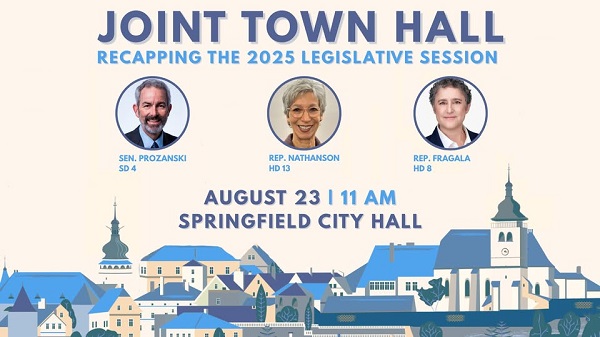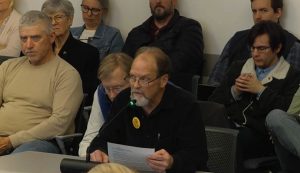Legislators say we can only weather $15B federal shortfall by helping one another
12 min read
Presenter: Speaking Aug. 23 in Springfield, area legislators said Oregon has no immediate answers for replacing $15 billion from the federal government. Speaker of the House Julie Fahey was isolated with COVID, but her remarks were read by Springfield Mayor Sean VanGordon:
Sean VanGordon (Springfield mayor): Somewhere between 100,000 and 200,000 Oregonians will lose their health care, not because of anything our state did, but because Donald Trump and the Republicans in Congress pulled the rug out from under us. And that leads to what comes next.
[00:00:32] The Trump administration, including his Republican Congress, has passed devastating budget cuts that will deeply impact our state for years to come. The most recent analysis shows that $15 billion will be cut from vital state programs over the next six years, mostly in the form of cuts to health care and cuts to food programs like SNAP, that lower-income families depend on.
[00:00:53] Let me reiterate: Trump’s bill will literally take food off families’ tables and kick hundreds of thousands of Oregonians off health care to give a few wealthy even bigger tax cuts.
[00:01:04] The truth is that no state budget, including ours, can absorb that kind of loss, and the people who will feel it most are families, seniors and working Oregonians. That’s a huge series of challenges that we’ll have to face ahead, together, in the months to come. The impact from the Trump and Republican Congress is real, but so is the progress we’ve made in Oregon.
[00:01:23] Despite the real pain the Trump economy is causing, we can protect many of the gains we’ve made and make sure Oregon stays a place where people are safe, healthy, and supported.
[00:01:34] Presenter: Later in the session, a question about federal funding cuts. How will Oregon respond to protect residents who depend upon SNAP and Medicaid? Sen. Floyd Prozanski:
[00:01:45] Floyd Prozanski (Oregon state senator): That’s a, unfortunately, a very good question. The reality, we do not have the answers as we sit here today. The reality is we are going to be under attack. We are under attack by these executive orders, backing out of deals negotiated with the states, and HR1 being passed, there’s still stuff being discovered as to what actually will be the impact.
[00:02:05] The guesstimation, and I say guesstimation because at this point we don’t know how much, but we’re going to be impacted by $15 plus billion, not millions, billions of dollars of lost revenue coming in from the federal government. That has been always a partnership of the federal government assisting states across this country to provide these type of services.
[00:02:27] I hate to say this. The reality is: Many, many of our friends, many, many of our neighbors, are going to be hurt drastically in this next two years.
[00:02:37] It is going to be imperative that we as community, as we, as members of that community, we help each other.
[00:02:44] I wish I had the ability to go down to the bottom of the Capitol and have a printing machine to print money. We don’t. So we will be needing to look at triaging the best we can and how we can actually stretch every dollar with efficiencies.
[00:03:00] We will see individuals going to be adversely impacted, ones that have been assisted through these partnerships with our federal government being torn apart.
[00:03:13] So all I can say at this point, we’ll do the best we can… to see how we can stretch every dollar we have to assist every Oregonian we can.
[00:03:23] Presenter: He later added:
[00:03:25] Floyd Prozanski (Oregon state senator): …some really, really, really tough times for many Oregonians. Please take care of each other. Please think about the neighbors that you have, those who are elderly or those who have special needs. Check on ’em, make sure they’re okay, because it’s going to unfortunately, get much worse before it gets better.
[00:03:41] Presenter: Rep. Lisa Fragala:
[00:03:44] Lisa Fragala (Oregon state representative) We’re facing near to an $11.7 billion shortfall, because of the decisions that have been made by the Trump administration and Republicans in Congress. Decisions that are not about protecting the services that their communities need, but that are about ensuring that some of the wealthiest people in our country have large tax breaks.
[00:04:13] And so we will spend a significant amount of time, probably in the short session, looking at how do we rebalance our budget? How do we hold the line on the services that we know our communities need? And how do we hold the line on those communities, those members in our community that are most vulnerable?
[00:04:40] We are not going to be able to backfill everything. But we are going to try to make sure that we do our best to fix the problems where they are and to try and ensure that our most vulnerable community members have the services that they still need.
[00:04:59] It is going to take all of us being able to come together to find solutions.
[00:05:05] Presenter: Rep. Nancy Nathanson:
[00:05:08] Nancy Nathanson (Oregon, state representative): DOGE, the so-called Department of Government Efficiency. It was never an official department. It was never an agency approved by Congress. They’ve already taken the personal identification, massive amounts of personal identification from databases that the federal government had access to. And they’re asking states for additional personal identification.
[00:05:31] States are trying to resist what this administration and Congress has done: many of you have heard about immediate cutbacks, and we just heard through the question about one specific cut. There are cuts all across the board. Some of the cuts were really disturbing because in some cases a federal agency took back money that they had already awarded the grant for. And in fact, that the local organization had already spent some of the money because they had already signed the grant with the federal government.
[00:06:05] The federal government just said, ‘Oh, we’ve changed our mind. New administration, we don’t like that anymore.’ And then sent notices that they were taking the money back that had already been approved by Congress and the grant approved by the agency. So I’ve never seen anything like this. It’s breaking contracts.
[00:06:24] Businesses know you shouldn’t break contracts, and we’re supposed to have a court system that ensures contracts are fulfilled, which is why our attorney general is very much involved in a number of lawsuits. I don’t know that that’s what the courts will find.
[00:06:40] But I wanted you to be aware that on top of all of those specific program cuts that you’re hearing about, we will find out in about a week, less than a week in what’s called the ‘Economic and Revenue Forecast,’ what another impact of the one big ugly one big, beautiful bill is going to be.
On top of all the program cuts that have already happened, because Oregon is tied to the federal tax code, we will lose what is likely up to $1 billion a biennium from money that would otherwise be coming in. That’s because of the massive amount of tax breaks.
[00:07:25] Now, if all of the cuts were happening to make government more efficient and balance the budget, maybe some people would agree but that’s not what’s going on here. When you read the economic analysis, the federal deficit will be increasing because the federal government is giving a lot of money away to very wealthy individuals, very, very wealthy individuals.
[00:07:53] I am hoping that people in every community across the country—but especially here, because Eugene and Springfield are known for being very generous, very collaborative, having community organizations that work very well—I’m hoping that people will share in those tax breaks that they’re getting and give some of it back, share it with the community organizations that are helping with food, with shelter, with music, for kids in school, whatever it is.
[00:08:24] I’m hoping that some of that money will start to recirculate as a temporary measure of hope for some of our organizations.
[00:08:34] Sean VanGordon (Springfield mayor): In 2023, the state passed House Bill 2002, which ensures trans Oregonians can receive gender-affirming care. Will you commit to continuing to support House Bill 2002 in the face of federal attacks on trans Americans?
[00:08:47] Presenter: State Rep. Lisa Fragala:
[00:08:50] Lisa Fragala (Oregon state representative) Within the first month of the Trump administration, the president issued multiple executive orders, and some of them specifically targeting our trans community members… Targeting the ability for health care providers to be able to continue services.
[00:09:08] We actually have the strongest, reproductive health care act within the country (the Reproductive Health Equity Act) and I’m really proud of that. It’s robust and in some ways it’s stronger than legislation that covers the same protected classes in health care. It specifically calls out sex, sexual orientation, gender identity, age, or disability.
[00:09:33] Please know that your state government stands prepared to protect the rights of these community members, just like we would stand ready to protect the rights of any community members.
[00:09:46] There are some other things that we can do and that people are doing. And I am personally looking at a law in California, which basically addresses a growing and urgent disruption to care, which is within prescription of hormone therapy. And California Senate Bill 418 expands access to prescription hormone therapy by requiring pharmacists to dispense up to a 12-month supply and mandating that health plans and insurers covers these prescriptions.
[00:10:20] We also need to be very vigilant in terms of protecting abortion rights and other forms of reproductive health care.
[00:10:28] Planned Parenthood is very much under attack by the current federal government and the Republicans who currently control Congress. And they provide extensive health care for women and men for a variety of reasons, not just abortions. In fact, the majority of the work they do is around pap smears, testing, evaluating for cancer breast exams.
[00:10:58] And we are going to need to look at how we will continue to support this work primarily that is happening in rural and underserved communities, and what we can do at the state level to make sure that people can access that health care.
[00:11:13] Presenter: Sen. Prozanski:
[00:11:14] Floyd Prozanski (Oregon state senator): I think it’s important to call out that not only is the Legislature actively doing what we can but also in the executive branch, Dan Rayfield is our attorney general. He’s joined in 37 different lawsuits and one of ’em is dealing with gender-affirming care.
[00:11:28] Okay. This is one of those situations we have to understand, everyone, the more and more we see attacks on our state and every other state in this country, state’s rights under the 10th Amendment are under attack.
[00:11:41] And this is where we need to have, and I’m glad we have Dan Rayfield in the position we do because he is not bowing down as we are seeing from other threats that are coming from these executive orders that clearly go against our rights as a state, just like every other state in this country, to be able to maintain the coordination work within the bounds of the state and not being oppressed by the federal government.
[00:12:04] Presenter: The next question was about housing. Mayor Sean VanGordon:
[00:12:08] Sean VanGordon (Springfield mayor): How can we increase the funding for affordable housing, fair housing and anything related to low-income tenants and, and their fight for survival?
[00:12:16] Presenter: Rep. Fragala recapped the many bills passed to support renters and housing production, then was followed by Rep. Nancy Nathanson.
[00:12:26] Nancy Nathanson (Oregon state representative): Some of the things that seem really technical and small make a difference over time. We’re really turning over every stone.
[00:12:35] When Pastor Dan Bryant (maybe some of you know him), working with Square One Villages, came to tell me that there was a financing tool that they needed help with, I immediately saw the wisdom in what they were doing. Have you heard of limited equity co-ops? It’s where very low-income people can instead of just paying rent, they are actually paying to own something. They’re getting an ownership stake in the co-op so that they own a unit is sort of like a condo situation, if you will.
[00:13:10] It’s just that the land that it sits on is cooperatively owned. They have an ownership stake. The pride of ownership in your own home is tremendous. And so we passed that financing tool and then this year the legislature passed an additional expansion because it involves some tax credit situations. We wanted people in this situation to be on the same footing with other people who can afford to try to buy a home.
[00:13:36] So we, we have passed legislation to make sure that we’re giving some benefits and tax breaks to people in a very low-income situation who are buying into these limited equity co-ops. So I’m really pleased about that. Peace Village, who may have heard of that on River Road, that 70-unit Square One Villages can is continuing with this model to build more here, and we hope this will catch on around the whole state.
[00:14:02] Sean VanGordon (Springfield mayor): What steps are you taking to ensure Oregon’s public universities and community colleges have the funding and support they needed to keep higher education accessible and affordable for students?
[00:14:13] Presenter: Rep. Lisa Fragala:
[00:14:15] Lisa Fragala (Oregon state representative) This is a chronic story in higher education in our state, where we have underfunded higher education for, I’m just going to say, decades.
[00:14:28] And the impacts of that are significant increases in tuition because institutions are forced to increase tuition to make up the difference. And the results are also loss of services and programs to students.
[00:14:48] So I saw signs over here earlier that the U of O is in crisis. I actually think that our entire system is in crisis… Some people are concerned they may not even be able to survive.
[00:15:04] I believe we need to begin thinking about revenue reform in this state. Just this past week, the House Higher Education Committee met with the governor’s office to tell her we want to begin to think about this at a systematic level. Our higher education system, which is critical to workforce development and our economy, as well as educating productive citizens within a democracy, is in crisis.
[00:15:34] Even though it’s a difficult economic time, I think it’s the right time to begin to do something.
[00:15:39] Sean VanGordon (Springfield mayor): What can you tell residents of Eugene’s West Side about McKenzie Willamette Hospital’s plan to open an emergency room in our area.
[00:15:47] Presenter: Rep. Nathanson:
[00:15:49] Nancy Nathanson (Oregon state representative): McKenzie Willamette Hospital announced at a health care forum months and months ago that they were looking at opening a site in West Eugene. They indeed pursued that. I have confirmed with the Oregon Health Authority that they did seek the permission to open up a satellite emergency department that wasn’t in a hospital. It would be a satellite, but associated with a hospital.
[00:16:16] Oregon Health Authority approved their request. They have the permission to do it. They are currently in the design and planning stage and working with a developer on a location in West Eugene.
[00:16:32] The only thing that gives me pause is that McKenzie Willamette announced that their two top executives had left. This is just a few weeks ago. We do not have information on why they left. There is someone in an acting, acting as the leader. There is someone in that role now, and they have assured us that they are continuing with their planning.
[00:16:55] Presenter: Echoing previous comments by Sen. Prozanski and Rep. Nathanson, Rep. Lisa Fragala:
[00:17:03] Lisa Fragala (Oregon state representative) We really need to come together during these hard times. And a favorite quote of mine: ‘The antidote to despair is action.’ And I know that people are struggling. These are dark times, these are challenging times, but I try to remember that every day, right? ‘The antidote to despair is action.’
[00:17:30] And I encourage you to find even just one place where you can plug in. Maybe it’s education, maybe it’s housing, maybe it’s rights. Find one place and get connected with other people working on those issues. Because I think that if we all come together, we will do a much better job of weathering the storm. And we will come out in the future because another good quote is, ‘The arc of justice tends towards the good.’
[00:18:04] Presenter: Heading into a special legislative session on transportation, local lawmakers acknowledge that hundreds of thousands of Oregonians will soon lose federal aid for food, housing, and health care.
[00:18:17] Field reporting by Jana Thrift for Legalize Survival, Wednesday evenings at 7 on KEPW 97.3. Drop in and meet with producers at the studio in the Growers Market. Your community radio station recognizes all volunteers in our local time banks.




